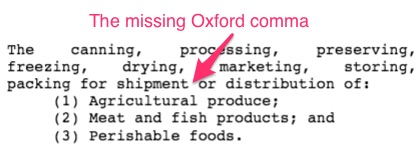On September 19, 1905, a group of typesetters in Moscow went on strike. Paid per set of 1,000 letters, they wanted commas also to be counted in their piecework rate (and a shorter working day).
Ranging from bakers to railway employees, other workers soon left their jobs in sympathy. Together they created a revolution that we could say was caused by a punctuation mark.
And now again, a group of workers cares very much about a comma.
The Oxford Comma
Our story starts with the Oxford comma. Also known as the serial comma, the Oxford comma is placed before and or or.
- At the market he bought oranges, apples, spinach, and kale.
- At the market he bought oranges, apples, spinach and kale.
In the first example, the Oxford comma that follows and lets us know that he had four separate items. However, without that comma, he had oranges, apples, and a spinach/kale package,
Kevin O’Connor v. Oakhurst Dairy
Maine law says most workers are eligible for 1 1/2 times their regular pay for overtime that exceeds a 40 hour week. They did though exclude people doing “packing for shipment or distribution.”
In the O’Connor case, Oakhurst Dairy delivery drivers said they should get overtime because the law did not exclude them from overtime. It only applied to those who did packing for shipment or distribution. Disagreeing, their employers said the language referred to those who did the packing and the (drivers who did the) distribution.
Below you can see the regulatory language:
The Opinion
Because the exclusion was ambiguous and the legislature had a remedial objective, the court concluded that the drivers should get their extra money. As the judge said, “For want of a comma, we have this case.”
Our Bottom Line: Externalities
Defined as the impact of an event or a decision on an uninvolved third party, externalities pop up everywhere. With the Maine case, the workers would say they were enjoying a positive externality from the regulatory language.
My sources and more: About history, grammar, unions, overtime, the O’Connor case opinion was fascinating. It initially took me to Lynne Truss’s chapter on commas in her grammar book, Eats, Shoots & Leaves, and to Leon Trotsky’s description of the typesetters who started the first Russian revolution. However, if you just want a summary of the case, Quartz did a good job.
This post was slightly edited after it was published.








